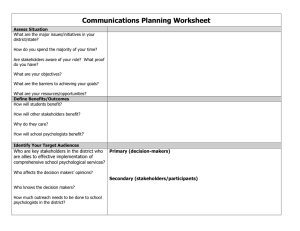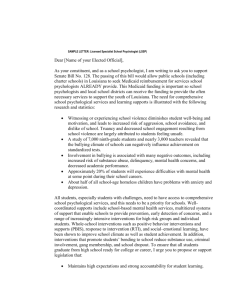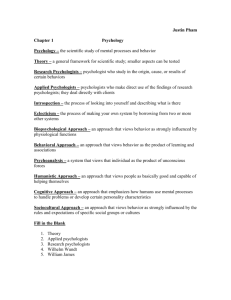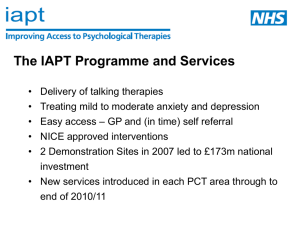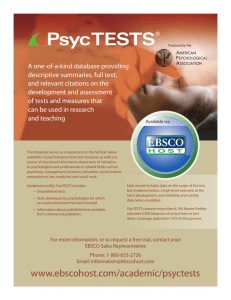PSYC 607 Section 001, 3 credit hours Curriculum-Based Assessment and Academic Interventions
advertisement
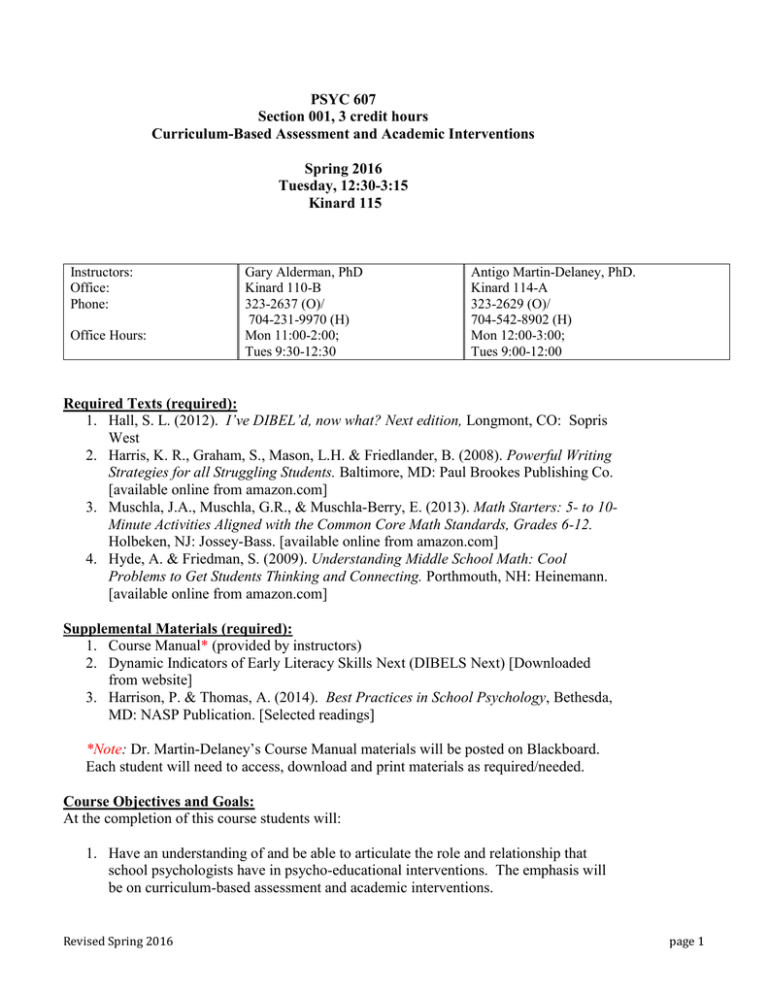
PSYC 607 Section 001, 3 credit hours Curriculum-Based Assessment and Academic Interventions Spring 2016 Tuesday, 12:30-3:15 Kinard 115 Instructors: Office: Phone: Office Hours: Gary Alderman, PhD Kinard 110-B 323-2637 (O)/ 704-231-9970 (H) Mon 11:00-2:00; Tues 9:30-12:30 Antigo Martin-Delaney, PhD. Kinard 114-A 323-2629 (O)/ 704-542-8902 (H) Mon 12:00-3:00; Tues 9:00-12:00 Required Texts (required): 1. Hall, S. L. (2012). I’ve DIBEL’d, now what? Next edition, Longmont, CO: Sopris West 2. Harris, K. R., Graham, S., Mason, L.H. & Friedlander, B. (2008). Powerful Writing Strategies for all Struggling Students. Baltimore, MD: Paul Brookes Publishing Co. [available online from amazon.com] 3. Muschla, J.A., Muschla, G.R., & Muschla-Berry, E. (2013). Math Starters: 5- to 10Minute Activities Aligned with the Common Core Math Standards, Grades 6-12. Holbeken, NJ: Jossey-Bass. [available online from amazon.com] 4. Hyde, A. & Friedman, S. (2009). Understanding Middle School Math: Cool Problems to Get Students Thinking and Connecting. Porthmouth, NH: Heinemann. [available online from amazon.com] Supplemental Materials (required): 1. Course Manual* (provided by instructors) 2. Dynamic Indicators of Early Literacy Skills Next (DIBELS Next) [Downloaded from website] 3. Harrison, P. & Thomas, A. (2014). Best Practices in School Psychology, Bethesda, MD: NASP Publication. [Selected readings] *Note: Dr. Martin-Delaney’s Course Manual materials will be posted on Blackboard. Each student will need to access, download and print materials as required/needed. Course Objectives and Goals: At the completion of this course students will: 1. Have an understanding of and be able to articulate the role and relationship that school psychologists have in psycho-educational interventions. The emphasis will be on curriculum-based assessment and academic interventions. Revised Spring 2016 page 1 2. Have developed effective consultation skills as they relate to helping the classroom teacher and other educators in the remediation of skills for special needs students. 3. Have gained a general understanding of how reading, written language, and math are taught to and learned by all age students in the schools. 4. Be able to identify the specific characteristics of students who are learning disabled, slow learners, and generally at-risk for various academic and social difficulties. 5. Have a general understanding of the process and psychology of a reading disability. Be able to diagnose specific problems with reading and develop interventions, accommodations, and progress monitoring to remediate these problems at Tier I, II, and III levels. 6. Have developed a general understanding of the process of written language (including spelling) and the components of a written language disorder. Develop the skills to remediate, accommodate, and progress monitoring for these problems at Tier I, Tier II, and Tier III levels. 7. Be able to identify the sequence of learning that takes place in the acquisition of math skills and be able to develop interventions, accommodations, and progress monitoring for students with math problems at the Tier I, II, and III levels. 8. Have developed the skills for conducting Curriculum Based Measurement (CBM) of basic academic problems and provide progress monitoring using such methods as AimsWeb, easy CBM, etc. 9. Have a general knowledge of interventions for alternative instruction and curricula for students at risk for academic problems in reading, math and written language. 10. Administer, score, and interpret the Dynamic Indicators of Basic Early Literacy Skills (DIBELS) Next and the Phonological Awareness Test (PAT). Course Format: The course will be taught using the following approaches: Lecture Individual and group problem solving with actual or continued cases. Students will generate solutions and interventions for cases and the fellow students will critique and make recommendations. Students will practice skills on children who are at-risk for academic problems. Students will read and critique articles reporting on meta-analytic findings of effective interventions Revised Spring 2016 page 2 Students will participate in small group presentation projects demonstrating how to implement an evidence-based intervention, presenting evidence that supports the use of the intervention Course Requirements: [Please see the point values table for all course requirements] 1. In-class problem-solving cases both formal and informal. 2. Administration of the following: a. Three (3) DIBELS Next cases (those using LNF, FSF, PSF and NWF) (one video required in addition to a written interpretation/analysis for each student); b. One (1) PAT (no written interpretation required); c. Three (3) complete reading CBMs (DIBELS Next ORF) (three students with 3 probes each; written interpretation/analysis for each student); d. Two (2) Writing/Spelling CBMs [two students (one in grades 2-5; the other in grades 6-8)]. Three (3) writing and spelling CBM probes will be given to each students. An integrated, written analysis of results for each student is required. Recommendations for Tier 2 instructional strategies and/or accommodations as appropriate for each student must be includes at the end of your written analysis. e. Two 2 Math CBMs [two students (one in grades 2-5; the other in grades 68)]. For each student you will administer three (3) Computation benchmark probes to each student and one (1) Concepts & Applications benchmark probe the same student. An integrated, written analysis of results for each student is required. The written analysis must include recommendations for Tiers1/2 instructional strategies and/or accommodations as appropriate for each student. 3. Evidence of preparation for class through reading of assignments and effective participation in class activities as shown in the Rapid Fire activity (see explanation and point values). 4. Evidence-based Math and Writing Strategies Team Presentations Working in small groups (2-3 students max.), students will research math and writing strategies (not presented in texts for class) and prepare a brief presentation to peers. Each team must identify two math and two writing strategies appropriate for use at Tier 2. One strategy must be for upper elementary (grades 3-5) the other for use with middle school (6-8). As part of your presentation you will fully demonstrate how a teacher or paraprofessional would use one of the strategies to assist a group of Revised Spring 2016 page 3 struggling students. (Your peers are your small group students, come prepared teach them using the strategy!) Additional requirements for this assignment will be posted on Blackboard along with the Grading Rubric Graded Components Points Grade % 3 Problem-solving cases (Reading) (25 points each) 75 15% DIBELS write-ups and video 60 15% DIBELS Reading Oral Fluency (CBM’s with write-ups) 60 13% PAT protocol only, no write-up required 20 3% Writing/ Spelling CBMs with write-ups 60 17% Math CBMs with write-ups 60 17% Rapid Fire Reading Requirement 4% Reader 20 Discussant 10 Evidence-based Strategies Team Presentations (Writing and Math) 75 16% 100% *Note: Assignments in this course are not of equal proportion/weight. Weighting is used when determining final grades, not total points accumulated. Grade A Revised Spring 2016 Description Quality of work is superior; student not only demonstrates high achievement but also superior intellectual initiative beyond the objectives of the course; superior test Final Grade (weighed) 95 - 100 page 4 performance; consistent superior performance across all work and skill development. A- Quality of work is excellent; candidate demonstrates either high achievement (by going beyond the requisites of the course) or surpasses expectations for a candidate at this level; clearly demonstrates knowledge and competence beyond course requirements exceptional analytical thinking and oral discourse during class discussions 90 - 94 B+ Quality of work is above average; candidate demonstrates clear understanding of the material and work is proficient and relatively free of errors; above average skill development; good analytical thinking and oral discourse during class discussions 87 - 89 B Quality of work is good; candidate has requisite understanding of the material; a few flaws in applying, integrating concepts/information; good participation in oral discourse; good skill development. 84 - 86 B- Quality of work is acceptable, but limited conceptual understanding of the material/issues was demonstrated; participation in class discourse was somewhat limited; skill development continues to need work and close monitoring. 80 - 83 F Quality of work is unacceptable; conceptual errors greatly exceed those of peers; has not effectively integrated concepts and information presented/discussed at expected level during discourse presentations; did not demonstrate competence in skills develop consistent with expectations or peers Below 70% Attendance Policy In accordance with the policy of the School Psychology Program at Winthrop, students are allowed no more than one absence. If a student is absent, they need to notify the instructor prior to the absence if possible and if not, notify the instructor as soon as possible. All assignments that are late will result in the loss of five points for every day they are late up to half the total credit. The classes will be designed to have a variety of teaching approaches each week and we are very committed to students getting enjoyment from the class and having fun Revised Spring 2016 page 5 while learning. We welcome any and all input throughout the semester from you. We will be glad to consider your ideas. Students with Disabilities If you have a disability and need classroom accommodations, please contact Coordinator for the Office of Disabilities Services (ODS), at 323-6174, as soon as possible. Once you have your “professor notification letter”, please notify the professors so that we are aware of your accommodations well before the first test/paper/assignments. Student Conduct Code “Responsibility for good conduct rests with students as adult individuals.” The policy on student academic misconduct is outlined in the “Student Conduct Code Academic Misconduct Policy” online at: http://www2.winthrop.edu/studentaffairs/handbook/StudentHandbook.pdf. Revised Spring 2016 page 6 Tentative Schedule (This schedule is tentative and may change throughout the semester. Students will be given notice of any changes.) Jan 12 Topic Assignment Introductions; Syllabus; Role of the School Psychologist with Psycho-educational interventions; Norm and Criterion-referenced tests; indirect and direct assessment; Assessing the academic environment; The psychology of reading and the big ideas. Manual, 1-18 Manual, 14-18 DIBELS Package BP, Chap. 7 Hall, Chap. 2 Jan. 19 The psychology of reading; DIBELS Jan. 26 DIBELS: PAT Self-Study DIBELS Package Hall, Chapter 3 & 4 BP, Chap. 4 Feb 2 DIBELS Practice Progress monitoring; Miscue Analysis; Interventions: Time, Scheduling and Grouping DIBELS Package Manual, 19-40 Hall, Chapters 5 and 8 BP, Chap. 8 Feb. 9 NASP, No Class Feb. 16 Same as class for Feb. 2 Feb. 23 Phonological awareness interventions Formal problem-solving case #1 Manual, 43-63 Hall, Chapters 9, 10, & 11 Article I * DIBELS video and cases due Mar 1 Alphabetic Principle and Fluency Interventions Formal problem-solving case #2 Manual, 64-109 Hall, Chapters 12 and 13 Article II PAT protocol due Mar. 8 Vocabulary and Comprehension Interventions Formal problem-solving case #3 Manual, 110-165 Hall, Chapters 14 and 15 Article III *ORF (CBM reading) cases due Revised Spring 2016 page 7 March 17 Spring Break (No Class) March 24 Understanding Writing and Spelling Problems March 31 Understanding Writing & Spelling Problems (cont.) Writing & Spelling CBM Administration and Scoring of Writing & Spelling CBMs materials on Blackboard Harris et al., Part 2 & 3 April 7 Understanding Problems in Math: Big Ideas in Mathematics National Math Panel Report Math CBM materials on Blackboard Writing & Spelling CBM Write-ups Due (upload to Blackboard) April 14 Big Ideas in Mathematics (cont.) & Math CBM Admin and Scoring Guidelines Math Strategies materials on Blackboard Harris et al., Parts 4 & 5 April 21 Tier 2 Interventions for Math Problems: 7 Principles for Effective Practice Harris et al., Part 6 April 30* Team Presentations on Evidence-based Interventions Fianl Exam Day @ 11:30am* Math CBM Write-ups Due (upload to Blackboard) Revised Spring 2016 Best Practices Chapter 25 Harris et al., Part 1 page 8 Winthrop School Psychology Program Syllabus Addendum for PSYC 607 School Psychology Program students’ grades are aggregated and used to document their attainment of knowledge and skills. This form documents the relationship of this course to the NASP graduate education and practice domains and how course grades are determined by the instructor. NASP Domains of Training and Practice 2.1 Data-Based Decision-Making and Accountability • School psychologists have knowledge of varied methods of assessment and data collection methods for identifying strengths and needs, developing effective services and programs, and measuring progress and outcomes. • As part of a systematic and comprehensive process of effective decision making and problem solving that permeates all aspects of service delivery, school psychologists demonstrate skills to use psychological and educational assessment, data collection strategies, and technology resources and apply results to design, implement, and evaluate response to services and programs. 2.2 Consultation and Collaboration • School psychologists have knowledge of varied methods of consultation, collaboration, and communication applicable to individuals, families, groups, and systems and used to promote effective implementation of services. • As part of a systematic and comprehensive process of effective decision making and problem solving that permeates all aspects of service delivery, school psychologists demonstrate skills to consult, collaborate, and communicate with others during design, implementation, and evaluation of services and programs. Revised Spring 2016 Course Focus This domain is: Not a focus of the course A minor focus of the course A major focus of the course This domain is: Not a focus of the course A minor focus of the course A major focus of the course Assessment Methods Knowledge and skills in this domain are assessed with: Not applicable Exams Papers Candidate presentations Graded simulations Other: Please describe Knowledge and skills in this domain are assessed with: Not applicable Exams Papers Candidate presentations Graded simulations Other: Please describe page 9 2.3 Interventions and Instructional Support to Develop Academic Skills • School psychologists have knowledge of biological, cultural, and social influences on academic skills; human learning, cognitive, and developmental processes; and evidence-based curriculum and instructional strategies. • School psychologists, in collaboration with others, demonstrate skills to use assessment and data-collection methods and to implement and evaluate services that support cognitive and academic skills. 2.4 Interventions and Mental Health Services to Develop Social and Life Skills • School psychologists have knowledge of human developmental processes, techniques to assess these processes, and direct and indirect services applicable to the development of behavioral, affective, adaptive, and social skills. • School psychologists, in collaboration with others, develop appropriate behavioral, affective, adaptive, and social goals for students of varying abilities, disabilities, strengths, and needs; implement interventions to achieve those goals; and evaluate the effectiveness of interventions. Such interventions include, but are not limited to, consultation, behavioral assessment/intervention, and counseling. Revised Spring 2016 This domain is: Not a focus of the course A minor focus of the course A major focus of the course This domain is: Not a focus of the course A minor focus of the course A major focus of the course Knowledge and skills in this domain are assessed with: Not applicable Exams Papers Candidate presentations Graded simulations Other: Please describe Knowledge and skills in this domain are assessed with: Not applicable Exams Papers Candidate presentations Graded simulations Other: Please describe page 10 2.5 School-Wide Practices to Promote Learning • School psychologists have knowledge of school and systems structure, organization, and theory; general and special education; technology resources; and evidence-based school practices that promote academic outcomes, learning, social development, and mental health. • School psychologists, in collaboration with others, demonstrate skills to develop and implement practices and strategies to create and maintain effective and supportive learning environments for children and others. This domain is: Not a focus of the course A minor focus of the course A major focus of the course 2.6 Preventive and Responsive Services • School psychologists have knowledge of principles and research related to resilience and risk factors in learning and mental health, services This domain is: in schools and communities to support multiNot a focus of the tiered prevention, and evidence-based strategies course for effective crisis response. A minor focus of the course • School psychologists, in collaboration with others, demonstrate skills to promote services that enhance learning, mental health, safety, and physical well-being through protective and adaptive factors and to implement effective crisis preparation, response, and recovery. Revised Spring 2016 A major focus of the course Knowledge and skills in this domain are assessed with: Not applicable Exams Papers Candidate presentations Graded simulations Other: Please describe Knowledge and skills in this domain are assessed with: Not applicable Exams Papers Candidate presentations Graded simulations Other: Please describe page 11 2.7 Family–School Collaboration Services • School psychologists have knowledge of principles and research related to family systems, strengths, needs, and culture; evidence-based strategies to support family influences on children’s learning, socialization, and mental health; and methods to develop collaboration between families and schools. • School psychologists, in collaboration with others, demonstrate skills to design, implement, and evaluate services that respond to culture and context and facilitate family and school partnership/ interactions with community agencies for enhancement of academic and social–behavioral outcomes for children. 2.8 Diversity in Development and Learning • School psychologists have knowledge of individual differences, abilities, disabilities, and other diverse characteristics; principles and research related to diversity factors for children, families, and schools, including factors related to culture, context, and individual and role differences; and evidence-based strategies to enhance services and address potential influences related to diversity. • School psychologists demonstrate skills to provide professional services that promote effective functioning for individuals, families, and schools with diverse characteristics, cultures, and backgrounds and across multiple contexts, with recognition that an understanding and respect for diversity in development and learning and advocacy for social justice are foundations of all aspects of service delivery. Revised Spring 2016 This domain is: Not a focus of the course A minor focus of the course A major focus of the course Knowledge and skills in this domain are assessed with: Not applicable Exams Papers Candidate presentations Graded simulations Other: Please describe This domain is: Not a focus of the course A minor focus of the course A major focus of the course Knowledge and skills in this domain are assessed with: Not applicable Exams Papers Candidate presentations Graded simulations Other: Please describe page 12 2.9 Research and Program Evaluation: • School psychologists have knowledge of research design, statistics, measurement, varied data collection and analysis techniques, and program evaluation methods sufficient for understanding research and interpreting data in applied settings. • School psychologists demonstrate skills to evaluate and apply research as a foundation for service delivery and, in collaboration with others, use various techniques and technology resources for data collection, measurement, analysis, and program evaluation to support effective practices at the individual, group, and/or systems levels. 2.10 Legal, Ethical, and Professional Practice • School psychologists have knowledge of the history and foundations of school psychology; multiple service models and methods; ethical, legal, and professional standards; and other factors related to professional identity and effective practice as school psychologists. This domain is: Not a focus of the course A minor focus of the course A major focus of the course This domain is: Not a focus of the • School psychologists demonstrate skills to course provide services consistent with ethical, legal, and A minor focus of professional standards; engage in responsive the course ethical and professional decision-making; A major focus of collaborate with other professionals; and apply the course professional work characteristics needed for effective practice as school psychologists, including respect for human diversity and social justice, communication skills, effective interpersonal skills, responsibility, adaptability, initiative, dependability, and technology skills. Revised Spring 2016 Knowledge and skills in this domain are assessed with: Not applicable Exams Papers Candidate presentations Graded simulations Other: Please describe Knowledge and skills in this domain are assessed with: Not applicable Exams Papers Candidate presentations Graded simulations Other: Please describe page 13


